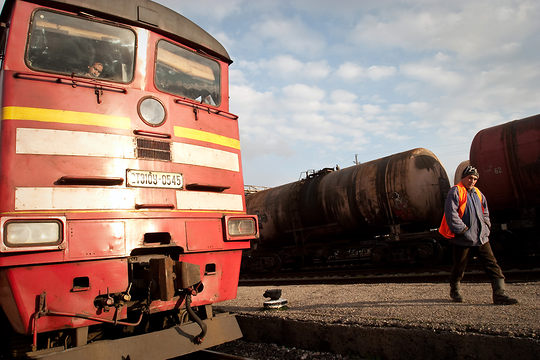
Congress Reviews Central Asia (Part Two): Non-Security Issues
Publication: Eurasia Daily Monitor Volume: 9 Issue: 147
By:

Much of the July 24 hearing of the Subcommittee on Europe and Eurasia of the House Foreign Affairs Committee (for Part One of this article, detailing security issues, see EDM, August 1) focused on how to promote US economic goals in Central Asia, as well as civil society, rule of law, human rights and democratic reform in the region.
For example, the committee sought to assess the progress of the Obama administration’s “Silk Road” Initiative. Committee member Representative Dan Burton stressed the connection between trade and security, noting that, “Trade, particularly between the neighboring states, can and should have a stabilizing effect on the relations between these countries.” He added that the states must cooperate to create the pipeline networks needed for “the continued development of Central Asia’s vast energy resources.” Burton also said he was “eager to hear what the [State Department] is doing to assist US companies that seek to invest in Central Asia” (House Foreign Affairs Committee, July 24).
Assistant Secretary of State for Central and South Asian Affairs Robert Blake, who delivered the main testimony at the hearing, affirmed that the administration had “made it a priority to try to support American business, not just because we want to create American jobs, but also because we believe there are some quite significant opportunities.” Blake reviewed how he and the US ambassadors to the region have sought to open doors for US companies. “But it’s also incumbent upon all these countries to do their part to open up their markets and to make it a more accessible and more friendly business environment” (House Foreign Affairs Committee, July 24).
Assistant Secretary Blake was effusive in his remarks regarding Kazakhstan, noting that it “is considered to have the best investment climate in Central Asia, as evidenced by the numerous international and American companies that utilize Kazakhstan as a regional headquarters.” Blake also noted how Kazakhstan “has supported expanded trade in the region and has invested in the Central Asian Regional Economic Cooperation Infrastructure Network.” The State Department official said the administration “strongly supports Kazakhstan’s bid to join the WTO” and endorsed congressional efforts to repeal the Jackson-Vanik Amendment and other barriers to trade with Kazakhstan and the other former Soviet republics. Blake also noted that Kazakhstan was unique among the countries of Central Asia in allowing the United States to “regularly host forums on democracy and human rights with local NGOs” (House Foreign Affairs Committee, July 24).
The press in Kyrgyzstan noted that Blake praised this small Central Asian republic for holding free and fair parliamentary elections, but also that he reaffirmed US officials wanted to see further progress in national reconciliation between ethnic Kyrgyz and Uzbeks in Kyrgyzstan, including by “ending abuses of detainees and holding the perpetrators of such abuses accountable under the rule of law” (AKI Press, July 26). Blake also cited the Kyrgyzstani government’s support for a July 2011 conference in Bishkek on the economic empowerment of women (focus.kg, July 26).
Local media further observed that Blake praised Turkmenistan’s “potential […] to be a leader in the economic prosperity of the region.” In this regard, the Assistant Secretary cited the recent signing of gas sales and purchase agreements between Turkmenistan, Pakistan and India for enabling the Turkmenistan-Afghanistan-Pakistan-India (TAPI) pipeline “to move to the commercial phase” (Central Asian News Service, July 26).
At the same time, Blake called on Turkmenistan to make mechanisms for investing in the country more transparent. Furthermore, he insisted that Turkmenistan “must make significant steps to fulfill its international obligations on human rights.” Blake reassured the Congressional subcommittee that, “The United States consistently raises concerns about respect for human rights at every appropriate opportunity, and we have offered assistance to help advance space for civil society and building democratic systems” (Central Asian News Service, July 26).
Uzbekistan’s media noted that Blake and Uzbekistani officials have agreed on the agenda for next month’s third session of the annual bilateral US-Uzbek consultations. These include “the issues of bilateral cooperation in political, trade, economic, investment, cultural and humanitarian issues, as well as other areas. Furthermore, “the two sides will exchange the views on international and regional security of mutual interest” (Trend News Agency, July 26). The first two rounds of the new annual consultations occurred in Washington in December 2009 and Tashkent in February 2011.
Uzbekistan Daily pointed out that, in his longer written statement, Blake said the Obama administration was encouraged by the significant investments General Motors has made in Uzbekistan and wanted to work with authorities in Tashkent to increase US investment in their country (UzDaily.com, July 26).
Another issue of concern to Uzbekistan is the planned construction of Rogun Dam in neighboring Tajikistan. Tajikistani authorities see the dam as essential for expanding their electricity generation, but Uzbekistan’s officials fear it would disrupt their water supplies or at least make them dependent on Dushanbe’s goodwill (see EDM, November 17, 2011). Blake told the hearing that, since energy issues and water management are sources of Tajikistani-Uzbekistani tensions, the United States was pressing Tajikistan not to begin building or diverting water for the dam until the World Bank completes its feasibility studies assessing the technical, economic, environmental and social impact of the project.
The two studies are being conducted by multinational consulting firms contracted on a competitive basis by the Government of Tajikistan and financed through the World Bank’s International Development Association (IDA), the part of the Bank that helps the world’s poorest countries. The first is a Techno-Economic Assessment Study by an international consortium of engineering firms such as Coyne et Bellier, Electroconsult, and IPA Energy & Water Consulting. The second, an Environmental and Social Impact Assessment, is being undertaken by Pöyry, a Swiss company. The World Bank has also established two independent expert panels of recognized international professionals to ensure that the studies meet international standards of due diligence, objectivity and credibility (web.worldbank.org). When he was in Washington for a World Bank meeting this May, Tajikistan’s Foreign Minister Zarifi Hamrahon said that his government expects the studies to be completed by February 2013 (Central Asian News Service, July 26).
The Tajikistani media noted that the US government planned to double the level of aid it provided Tajikistan through the US Foreign Military Financing Program while keeping the amount of military assistance the same for the other four countries (Pressa.Tj, July 30). At the hearing, Blake praised Tajikistan for providing strong support for Afghanistan and regional economic integration. He affirmed that a State Department objective was to help Tajikistan join the WTO. Nonetheless, “The United States is concerned about Tajikistan’s continuing efforts to limit human rights, including religious freedom and media freedoms” (House Foreign Affairs Committee, July 24).
Although Congress will soon break for the August recess, the hearing served the helpful purpose of raising many of the important issues at stake in the evolving US strategy toward Central Asia. The local media coverage also makes evident the value of these rare comprehensive reviews of US policies in the region, clarifying for local elites the sometimes opaque and conflicting goals sought by American diplomats in Central Asia.




